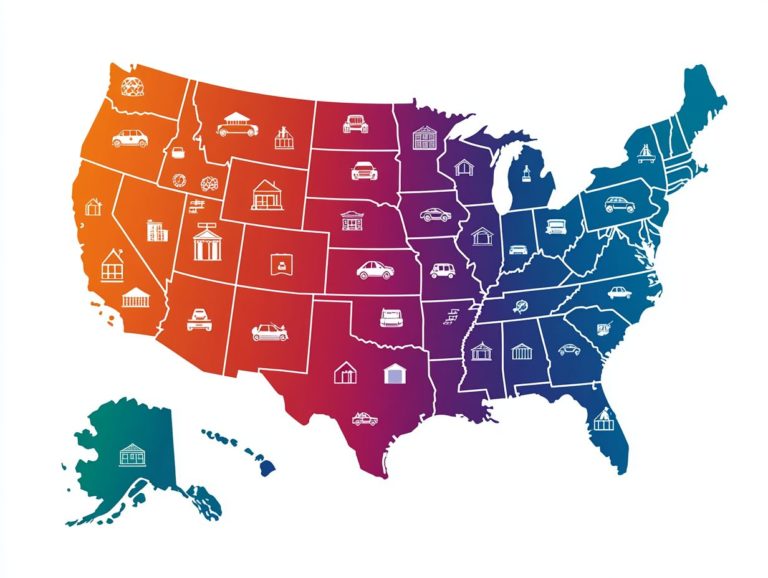Comparing Insurance Policies: A Guide for New Drivers
Navigating the world of car insurance can feel overwhelming, particularly for new drivers like yourself.
Grasping the different types of policies such as liability, collision, and comprehensive coverage is crucial for making informed decisions. This article outlines the key factors you should consider when choosing an insurance policy, including costs, coverage limits, and deductibles.
With practical tips for comparing policies, you’ll quickly discover the best coverage that suits your needs! Soon enough, you’ll be ready to hit the road with confidence!
Contents
- Key Takeaways:
- Types of Insurance Policies
- Factors to Consider When Choosing a Policy
- Tips for Comparing Policies
- Frequently Asked Questions
- 1. Why should new drivers compare insurance policies?
- 2. How do I compare insurance policies for new drivers?
- 3. Can I only compare policies from different insurance companies?
- 4. Are there any specific factors I should consider when comparing insurance policies for new drivers?
- 5. Is it possible to switch insurance policies after purchasing one for a new driver?
- 6. How often should I compare insurance policies for new drivers?
Key Takeaways:

- It is crucial for new drivers to have insurance to protect themselves and others on the road.
- When comparing insurance policies, consider factors such as cost, coverage limits, and deductibles.
- To make an informed decision, research and compare quotes, consider your driving habits, and read reviews or ask for recommendations.
Why Insurance is Important for New Drivers
For new drivers, grasping the significance of car insurance is absolutely essential; it greatly affects your financial decisions and overall safety on the road. The right insurance coverage does more than just protect you from potential accidents; it also helps you build a positive driving record, which is essential for securing better insurance premiums from various providers.
You may face higher rates at first, so it s vital to scrutinize all available options to find the perfect fit for your needs. Accident forgiveness is a policy feature that prevents your first accident from raising your rates, easing the financial pressure during this challenging learning phase.
Personal injury protection provides invaluable support by covering medical expenses regardless of fault. This is particularly important for those who might be more prone to accidents.
Remember, maintaining a clean driving record can significantly lower your insurance quotes over time. This gives you the chance to transition into lower insurance brackets. This advantage is especially pronounced compared to seasoned drivers, who typically enjoy benefits from their long-standing history of responsible driving.
Types of Insurance Policies
Grasping the different types of insurance policies available is crucial for both new and seasoned drivers as they traverse the intricacies of the insurance landscape. Each type of coverage whether it s liability insurance, collision coverage, or comprehensive coverage offers unique benefits. These options shield you from various risks and give you the power to make informed financial choices.
It s wise to evaluate minimum coverage requirements while also considering additional options tailored to your specific needs and circumstances.
Liability Insurance
Liability insurance is an essential pillar of any auto insurance policy. It covers the costs associated with bodily injury and property damage that you might cause in an accident. Often mandated by law, this type of insurance is crucial for new drivers. Ensuring you have at least the minimum coverage required in your state is a must.
Grasping how liability insurance operates can profoundly impact your financial decisions regarding car insurance. By providing a safety net during those unexpected moments, liability coverage protects you in the event of an accident and shields your assets from potential legal claims.
In many states, neglecting to maintain adequate liability insurance can result in serious repercussions, including fines and even the suspension of your driving privileges. Without sufficient coverage, the financial burden of an accident can spiral out of control, leading to out-of-pocket expenses that could have easily been avoided.
Therefore, it s vital for you to periodically review your policies to ensure compliance with legal requirements. Additionally, evaluate whether the coverage levels are adequate for your unique circumstances, ultimately fostering peace of mind on the road.
Collision Coverage
Collision coverage offers financial protection for your vehicle. It covers damages from accidents, regardless of who is at fault.
Considering the potentially high costs of vehicle repairs, it’s wise for new drivers to include this coverage in their insurance options. This protects your investment. Understanding how collision coverage impacts your insurance premiums enables you to make informed financial choices.
For many inexperienced drivers, unexpected accidents can lead to significant out-of-pocket expenses. This can become quite a financial burden. Collision coverage serves as a safety net, allowing you to manage repair costs without facing immediate financial strain.
Insurers often assess the risk associated with new drivers. Having this coverage can positively influence your overall premium costs.
To get the most out of your policy, it s advisable to compare collision coverage options from various auto insurers. This way, you can find the best balance between cost and full coverage tailored to your specific needs.
Comprehensive Coverage

Comprehensive coverage offers you protection against various non-collision-related incidents, including theft, vandalism, and natural disasters. This makes it an essential element of a solid car insurance policy.
For new drivers, this added layer of coverage can bring considerable peace of mind and financial security in an unpredictable insurance landscape. Evaluating the benefits of comprehensive coverage helps you make informed financial decisions about your car insurance.
This type of coverage differs from collision insurance, which addresses damages incurred in accidents involving other vehicles. For example, if an unexpected hailstorm dents your car or a tree branch falls during a storm, comprehensive coverage would step in to cover those costs.
It s vital for vehicle owners, especially those in areas prone to extreme weather or high crime rates, to assess their individual needs carefully. A practical strategy is to review past incidents in your region, consult with insurance agents, and compare premiums against potential out-of-pocket expenses in case of a claim.
By weighing these factors, you can determine whether the advantages of comprehensive insurance justify the additional costs.
Factors to Consider When Choosing a Policy
In selecting the right insurance policy, consider several key factors to ensure your decision aligns with your coverage needs and budget. Elements like cost, coverage limits, and deductibles are crucial, as they significantly influence your insurance premiums and overall satisfaction.
Your driving history affects your options and the rates offered by auto insurers. Making an informed decision now can lead to peace of mind later.
Cost
The cost of car insurance is a crucial factor that shapes your choice of policy. It s essential to understand how insurance premiums are calculated. Various elements, including your age, driving history, and the type of coverage you select, contribute to the average cost of insurance for new drivers.
By being aware of these factors, you can make more informed financial decisions regarding your insurance purchases. Understanding the nuances of each component can lead to considerable savings.
For example, young drivers often face higher premiums due to their inexperience. However, by maintaining a clean driving record and completing driver safety courses, they can demonstrate their commitment to safe driving, which may help lower their premiums.
Exploring potential discounts like bundling your insurance with other policies or being a member of specific organizations can also be advantageous. Evaluating different coverage options and considering aspects like deductibles and limits will allow you to tailor a policy that fits your personal needs and budget.
Don t wait to find the best coverage for your needs!
Coverage Limits
Understanding coverage limits can save you money! Coverage limits define the maximum amount your insurance company will pay in the event of a claim, making them a crucial factor when selecting a policy. As a new driver, often seen as a higher risk to insure, it s essential for you to evaluate your coverage limits carefully. This ensures you re adequately protected while avoiding any unnecessary financial strain.
This evaluation goes beyond just crunching numbers; it requires a comprehensive understanding of your personal finances and risk tolerance. For example, opting for higher coverage limits usually means higher monthly payments, which could put pressure on a tight budget. Conversely, choosing lower limits might save you some cash upfront, but it could expose you to hefty out-of-pocket expenses if an accident occurs.
Aligning your coverage limits with your individual circumstances doesn t just help mitigate risks; it also plays a critical role in managing your long-term insurance costs. This makes it an essential conversation for anyone taking the wheel.
Deductibles
Deductibles represent the amount you must pay out-of-pocket before your insurance coverage kicks in, and they play an important role in shaping your overall insurance costs. For new drivers, grasping how varying deductible levels influence insurance premiums is crucial when customizing policies to suit their coverage needs.
Making informed financial choices about deductibles can ultimately lead to substantial savings on monthly payments over time. These deductibles balance your monthly payments and what you can afford during emergencies. By choosing higher deductibles, you often benefit from reduced premium rates, which might be appealing if you re confident in managing smaller claims.
However, this strategy carries the risk of facing larger financial burdens if an accident occurs. Thus, it s essential to evaluate your financial situation carefully, weighing the potential savings against possible costs. This process helps you choose a deductible that fits your financial reality.
Tips for Comparing Policies

When you are evaluating car insurance, comparing insurance for family vehicles is a crucial step to secure the most suitable coverage that meets your needs while also being budget-friendly.
By researching various options such as comparing quotes and exploring available insurance discounts, which are reductions on your insurance costs for various reasons, you can pinpoint the most advantageous policies, including strong coverage for new drivers, tailored to your unique driving habits.
Consulting with insurance professionals can provide valuable insights, empowering you to make well-informed decisions. Don t miss out on savings! Compare your options now!
Research and Compare Quotes
Researching and comparing quotes from different insurance companies is an essential step in your quest for the perfect car insurance policy that aligns with both your coverage needs and budget. By gathering cost estimates from various insurers, you can gain a clearer understanding of the available options and make informed decisions about your coverage.
This thorough comparison will help you pinpoint policies that strike the ideal balance between price and protection. To simplify this process, consider utilizing a blend of online resources and insurance aggregator websites. For young drivers, these platforms can provide specific tips for young high-risk drivers seeking insurance, allowing you to input your information just once and receive multiple quotes from various insurers, making it easier to compare different coverage options side by side.
It s wise to reach out directly to auto insurers for personalized quotes, as they may offer discounts or unique features that aren t always highlighted online. By obtaining multiple quotes, you ensure that you re exploring all your options, leading to a more comprehensive understanding of your choices and potentially saving money in the long run.
Consider Your Driving Habits
Understanding your driving habits is crucial for selecting the right car insurance policy. These habits can significantly influence your premiums and coverage options.
Insurance companies assess driving behavior through various metrics to determine risk factors, which ultimately affects policy pricing. As a new driver, it s important to reflect on your driving patterns to find policies that align with your risk profile.
For example, factors like annual mileage and how often you re behind the wheel play pivotal roles in this assessment. If you re a regular long-distance commuter, you might face higher premiums due to greater exposure to potential accidents. Conversely, those who drive less frequently could qualify for lower rates.
A history of past accidents can increase your insurance costs, putting a strain on your wallet. By taking the time to evaluate your behaviors and past driving experiences, you can make informed decisions about which insurance options not only offer the best coverage but also come at a price tailored to your unique driving situation.
Read Reviews and Ask for Recommendations
Reading reviews and seeking recommendations from friends, family, and online forums can provide you with invaluable insights into the reliability and customer satisfaction of various insurance companies. Personal experiences shared by others can help you navigate the often-complex insurance market, giving you the power to make informed choices about your policies.
Understanding the reputation of different insurers can significantly influence your overall satisfaction with an insurance policy. By tapping into a broad spectrum of feedback, you can develop a comprehensive view of what to expect from various providers.
It’s important to weigh both positive and negative comments, as they often unveil critical information about claims processing, the responsiveness of customer support, and overall service quality.
Customer satisfaction metrics, such as ratings and testimonials, can act as a reliable compass in your decision-making process. Ultimately, a thorough examination of available reviews enables you to make more confident selections, ensuring that you choose an insurance company that aligns perfectly with your unique needs and expectations.
Frequently Asked Questions
1. Why should new drivers compare insurance policies?

Comparing insurance policies is crucial for new drivers as it allows them to find the best coverage and rates that suit their needs and budget. For more information on this process, check out what you need to know about comparing insurance policies. This helps them save money in the long run and ensures they have proper protection while on the road.
2. How do I compare insurance policies for new drivers?
To compare insurance policies, first determine the coverage and limits you need. Then, gather quotes from different insurance providers. Compare the premiums, deductibles (the amount you pay out of pocket before insurance kicks in), and coverage details to find the best option for you.
3. Can I only compare policies from different insurance companies?
No, you can also compare policies from the same insurance company. They may offer different packages or discounts, so it’s always worth comparing to find the most suitable policy for your needs.
4. Are there any specific factors I should consider when comparing insurance policies for new drivers?
Yes, there are a few factors to keep in mind when compare auto insurance policies effectively for new drivers. These include coverage options, deductibles, premiums, discounts, and customer reviews. It’s also important to check the financial stability of the insurance company.
5. Is it possible to switch insurance policies after purchasing one for a new driver?
Yes, it is possible to switch insurance policies even after purchasing one for a new driver. However, there may be cancellation fees or penalties involved, so make sure to read the terms and conditions carefully before making the switch.
6. How often should I compare insurance policies for new drivers?
It is recommended to compare insurance policies at least once a year or whenever there is a significant life change, such as moving to a new state or buying a new car. This ensures that you have the most up-to-date coverage and rates that suit your current needs.
Start comparing insurance policies now and find the best deal for your driving needs!






